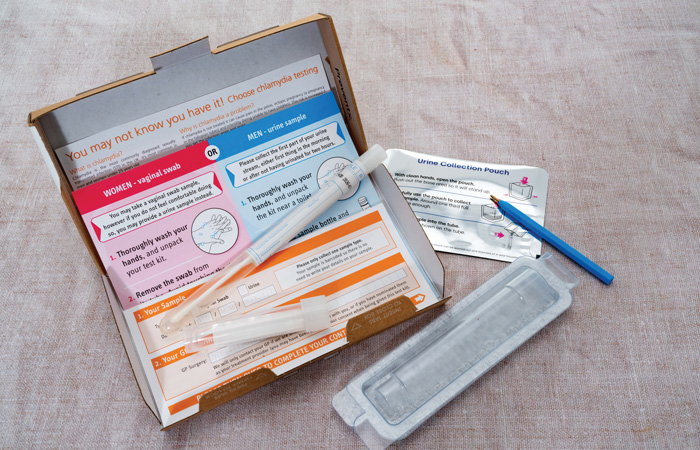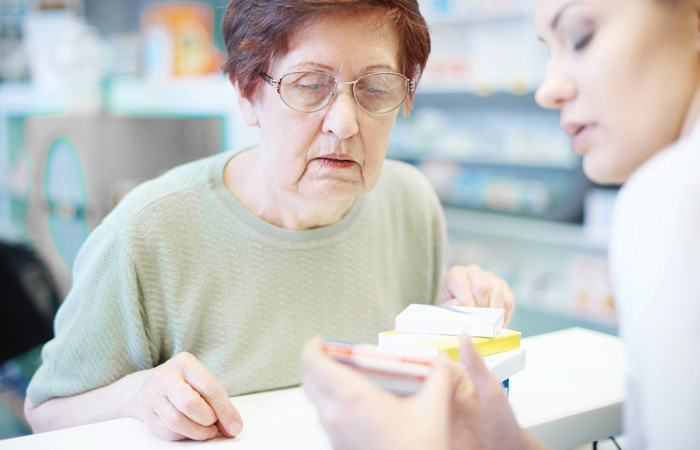In OTC
Follow this topic
Bookmark
Record learning outcomes
Sexually transmitted infections (STIs) are easy to catch and are on the rise. There were 401,800 diagnoses of new STIs in 2023 – an increase of 4.7 per cent since 2022, according to the UK Health Security Agency (UKHSA) in July 2024. The most common newly diagnosed STIs in 2023 were chlamydia (48.5 per cent), gonorrhoea (21 per cent), genital herpes (6.8 per cent) and genital warts (6.5 per cent). Although chlamydia diagnoses remained stable, gonorrhoea diagnoses increased by 7.5 per cent from 2022-23, and infectious syphilis diagnoses increased by 9.4 per cent during that same time period.
Untreated STIs can lead to serious health issues, such as infertility, cancers and pregnancy complications and, in the case of syphilis, life-threatening damage to the brain, heart and nerves. There is concern that gonorrhoea has developed resistance to certain antibiotics, limiting the treatment options available.
STIs can be passed on through unprotected vaginal, oral or anal sex, as well as sharing sex toys that haven’t been washed or covered with a new condom each time they’re used. The 2024 Safe Sex Report from Lloyds Pharmacy Online Doctor revealed three in five adults had been diagnosed with a sexually transmitted infection (STI) in the past, with one in five admitting they never practise safe sex.
Steph Katiyar, PrEP and sexual health pharmacist, says that community pharmacies play a critical role in supporting sexual health. “Most community pharmacies offer private consultation rooms, which create a confidential and safe space for open discussions,” she says. “Pharmacy teams should be alert to key indicators, such as concerns about contraception or pregnancy, sexual dysfunction or pain, and disclosures of sexual abuse or assault. These may signal underlying issues that require further attention or referral to specialist services.”
Symptom check
STI symptoms can affect both men and women but may take weeks or months to appear after being infected. Pharmacy teams should be able to recognise the red flags, such as genital sores, unusual genital discharge, pain during urination or sex, rashes, lumps or skin growths on the genital area, and unusual vaginal bleeding. Some STI symptoms can affect the rectum (pain, bleeding or itching), or the mouth or throat (sores or ulcers). General STI symptoms may include a fever, rash, swollen lymph nodes, fatigue or abdominal pain.
If a customer has any red flags, they should be advised to contact their GP. They may then be referred to a sexual health clinic, which can provide test results more quickly than a GP practice. Alternatively, a customer can go straight to a sexual health clinic (NHS or private) without a GP referral – they don’t need to give their real name or GP details. All STI tests are free through NHS clinics, but patients need to pay for testing through a private clinic.
“Poor sexual wellbeing can affect people’s general physical and mental health”
STI testing
STIs are often symptomless, so most people only find out they are infected if they choose to get tested. Around 70-80 per cent of women with chlamydia are unaware that they have the infection, while one in 10 men with gonorrhoea and almost half of women with gonorrhoea don’t experience any symptoms.
STI testing usually involves a swab of the vagina or penis, a urine sample or a fingerprick blood test, depending on what is being tested for. If the test is positive for an STI, patients will be given advice on what to do next. All results are kept confidential. Patients will be advised, however, to tell their current sexual partner, or partners, and any ex-partners, so that they can be tested and treated as well. Most STIs are treated with antibiotics.
Regular STI screening, including a HIV test, is recommended for anyone who could be at risk, especially if they have condomless sex with new or casual partners. Through the National Chlamydia Screening Programme, women under 25 can access a free, confidential chlamydia test from sexual health clinics and some pharmacies. The Sexual Health Hub (thesexualhealthhub.co.uk), which provides more than 400 NHS services across England, can send free and confidential chlamydia, gonorrhoea, HIV and syphilis test kits in the post to people living in certain areas, as long as they are over 16 and don’t have any STI symptoms.
Customers can use the website sh.uk to search for other local online sexual health services run in partnership with the NHS, including STI testing, contraception and free condoms.
“Some pharmacies offer chlamydia tests and treat services as private Patient Group Directions (PGDs), with pilots ongoing in two health boards providing free STI testing kits,” says Aled Roberts, member of the RPS Welsh Pharmacy Board. “These kits are available during patient consultations and for self-selection, directing people to appropriate treatment. There may be scope for independent prescribers to take a greater role in managing sexual health following positive test results, although this would require significant additional funding if proposed as an NHS service. Within pilot programmes, self-testing STI kits are sourced from reputable providers via LHB procurement.”
STI self-testing kits for home use are sold by some pharmacies (instore or online) for people who are at risk but don’t have any STI symptoms. It’s important that customers choose the right kits for their needs and circumstances. Different kits may be suitable for women, men, and men who have sex with men. Some kits may test for individual STIs (e.g. chlamydia or syphilis), while others can test for several infections. There are also separate oral tests and anal tests. If pharmacies are selling STI testing kits, the whole pharmacy team should be able to explain to customers how to use the tests properly.
“Community pharmacies offering STI kits can enhance accessibility, convenience and privacy for some customers,” says Steph. “They are an important part of providing choice. However, the reliability of at-home tests can vary depending on the manufacturer and the test’s sensitivity and specificity. The MHRA provides guidance on verifying the reliability of products.”

Where possible, customers should get tested for STIs with each new sexual partner.
In some areas, self-tests kit can be ordered and completed at home.
“Almost half of women with gonorrhoea don’t experience any symptoms”
Erectile dysfunction
Erectile dysfunction can affect men of all ages, but is particularly common in those over 40. However, many men are reluctant to seek help from their GP. Community pharmacies offer a range of management options over-the-counter, including:
- Pharmacy-only sildenafil tablets: these improve blood flow to the penis to help maintain an erection, starting to work within 30-60 minutes and lasting for up to four hours
- Pharmacy-only tadalafil tablets: these also improve blood flow to the penis to help maintain an erection, working within around 30 minutes and lasting for around 36 hours
- Topical gel: this stimulates the nerve endings in the penis to trigger an erection in around 10 minutes and is compatible with latex condoms and lubricants
- Penis vacuum pumps and rings: these create a vacuum around the penis, triggering blood flow to cause an erection – useful for men who can’t take sildenafil or tadalafil tablets due to contraindications (e.g. diabetes). Devices use air or water, and they may be manual or battery-operated
- Penis constriction rings: bands that apply pressure to the base of the penis to keep blood in the penis to maintain an erection – these come in a range of sizes, materials and types.
All treatment options have pros and cons, including potential side effects, so it’s important to be familiar with what is available. If the erectile dysfunction has a psychological cause, men may benefit from cognitive behavioural therapy or psychosexual counselling. Men with ongoing erectile dysfunction should be referred to their GP to check for an underlying cause. It’s usually nothing to worry about, but it may be a sign of an underlying health problem, such as diabetes or high blood pressure.
Contraception services
According to The 2024 Safe Sex Report, NHS data shows that oral contraceptives were the most popular method of contraception among women in 2024. The second and third most popular contraceptive methods were both long-acting, reversible contraceptives, including the implant, and the IU system (also known as the hormonal coil). In the survey, more than half of respondents said their primary reason for practising safe sex was to prevent unwanted pregnancy. However, a quarter said they don’t use contraception at all.
Since 2023, pharmacies signed up to the NHS Pharmacy Contraception Service can supply the oral contraceptive pill without a prescription to customers who meet certain criteria, after a confidential consultation. To be eligible, customers must be under 50 if they are requesting the combined oral contraceptive (COC) and under 55 if they are requesting the progestogen only pill (POP). Supplies of oral contraception are made by a pharmacist via a PGD. Some community pharmacies supply free emergency hormonal contraception (EHC) through a locally commissioned service, and many pharmacies sell EHC over the pharmacy counter.
“Community pharmacies are an accessible and convenient place for people to receive advice and support for contraception management,” says Jacquie Lee, Numark medication safety officer and information pharmacist. “Since the launch of the NHS England Pharmacy Contraception Service (PCS), pharmacists running the service can perform confidential consultations to request a supply of the contraceptive pill for the first time directly from their pharmacist, rather than from their GP or sexual health clinic – making the process accessible and convenient.”
Condoms
Although hormonal contraception is over 90 per cent effective in preventing unwanted pregnancies (with typical use), it doesn’t protect against STIs. Using condoms correctly and consistently is the best method of STI protection. According to the October 2024 STI Prioritisation Framework report by the UKHSA, condoms are highly effective at preventing STIs that spread via sexual fluids (such as gonorrhoea, chlamydia and HIV). They also offer limited protection against STIs that spread by skin-to-skin contact (such syphilis, genital herpes and human papilloma virus (HPV)).
Condoms are readily available to buy from pharmacies, supermarkets and corner shops, but customers may need advice on which ones to choose. Steph says that pharmacies can provide leaflets and brochures on correct usage, types of condoms, effectiveness and storage. “Pharmacies should ideally stock a diverse range of condoms to meet varying customer needs and preferences,” she says. “This includes offering latex condoms, the most common type, alongside non-latex alternatives such as polyisoprene or polyurethane for those with allergies. Condoms with added features, like extra lubrication or textured surfaces, can also enhance the selection. Providing a variety of sizes is crucial to ensure a comfortable and effective fit, reducing the risk of breakage.”
Condoms are also available for free from sexual health clinics, some GP surgeries and pharmacies and some young people’s services (through the National Sexual Health Helpline). “Some community pharmacies offer the Come Correct (C-Card) scheme which provides free condoms, lubrication, female condoms, dental dams, and sexual health information to people under 25,” says Steph. “Pharmacists and pharmacy staff should receive training on how to discuss condoms and safer sex practices in a non-judgmental and sensitive manner.”
Vaginal dryness
Vaginal dryness can affect women of all ages but is particularly common after the menopause. Common symptoms include vaginal irritation, soreness, burning and discomfort and an increased risk of urinary tract infections (UTIs). Vaginal dryness is also a cause of painful sex.
Pharmacies can offer several over-the-counter treatments for vaginal dryness, but customers with significant or persistent problems should speak to their GP. Pharmacy treatments include:
- Water-based lubricants used before sex: these make sex more comfortable by reducing friction
- Vaginal moisturisers: these are used daily to keep the inside of the vagina lubricated to prevent dryness and other symptoms
- Topical oestrogens (vaginal tablets or vaginal cream) to treat oestrogen deficiency: these are a form of hormone replacement therapy for women experiencing menopause-related vaginal atrophy/dryness. They are suitable for women over 50 who haven’t had a period for at least one year.
Self-help measures for vaginal dryness include using only unperfumed soaps and washes around the vagina, using specific vaginal moisturisers inside the vagina only (rather than any other type of moisturising products), and using foreplay before sex.

Vaginal dryness can be painful and uncomfortable, as well as embarrassing to address. It is important that pharmacy teams feel confident discussing such conditions and ensuring customers feel listened to.
“It’s important for pharmacy teams to help normalise the symptoms of conditions such as erectile dysfunction and vaginal dryness”
Conversations count
Sexual health involves more than just STI prevention and treatment and the use of contraception. Poor sexual wellbeing, such as painful sex or reduced libido (sex drive), can affect people’s general physical and mental health and impact relationships, work and daily life. Community pharmacies are ideally placed to advise (or signpost) about anything that could affect a healthy sex life.
It’s important that community pharmacy teams make every conversation count, says Jacquie. “If a customer is asking for emergency contraception, consider opportunities for safe sex advice, contraceptive choice consultation, and chlamydia screening, for example,” she says. “Sexual health awareness campaigns can also offer a less direct approach. It’s important for pharmacy teams to help normalise the symptoms of conditions such as erectile dysfunction and vaginal dryness by communicating that millions of people experience them, to make patients feel more comfortable, as these can be a sensitive subject.”
Signposting
If customers have any sexual health concerns, they can also contact the free National Sexual Health Helpline on 0300 123 7123 (Monday to Friday: 9am to 8pm; Saturday and Sunday: 11am to 4pm). The British Association for Sexual Health and HIV (BASHH) website (bashh.org) has information on all aspects of sexual health for healthcare professionals and patients, including clinical guidelines and patient information leaflets.

